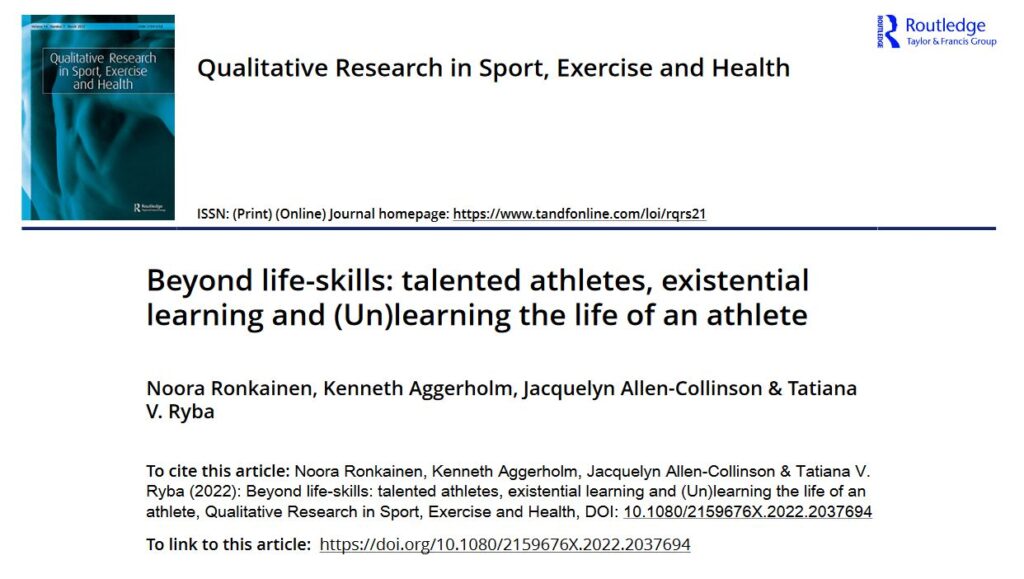Two typical assumption of our youth sport cultures are that sport contributes to positive youth development (PYD) and that participants learn something important not only for sport, but life in general. As our previous work with colleagues (as well as the work of other researchers) has pointed out, this learning in sport has been often conceptualised as things that make us more adaptable, productive, and employable. But are there also other forms of learning in sport that might sometimes be unwanted, but potentially serve other ends such as making us more self-reflective and aware of our values and how we want to live our lives?
Our final research article from the project Learning and Being in Sport: A Phenomenological Investigation was recently published in Qualitative Research in Sport, Exercise and Health. In this article, Beyond life-skills: talented athletes, existential learning and (Un) learning the life of an athlete (co-authored with Kenneth Aggerholm, Jacquelyn Allen-Collinson and Tatiana Ryba), we sought to expand on our previous theoretical work on existential learning, and to understand what else young people learn in sport beyond life-skills. 16 Finnish youth athletes took part in interviews.

Four important life lessons could be identified from Finnish youth athletes’ stories:
(1) Potentialities and limitations: While on the one hand it seems that it is good for us to believe in our possibilities, on the other hand, the reality of talent development is that very few youth athletes become elite athletes. The youth athletes learned about their limitations and that even if they do “everything right”, it might not lead them to success in elite sport. The setbacks such as injuries or illness could make young athletes aware of limitations, but also lead them to critically reflect on their lives and whether elite sport was the right path for them.
(2) “Being and Doing” recognitions: in our lives, we have conditional (such as work-roles) and unconditional (family and friends, hopefully) relationships. As some athletes progressed on their athletic pathway, they learned that their sport environment mostly operated with these conditional (‘doing’) recognitions. They felt that people only appreciated them if they performed up to expectations. In difficult times, it was especially important for them to know that they also had people around them who valued them for who they are.
(3) Being for oneself and others: Some athletes experienced being a talented or pre-elite athlete as a selfish endeavour. Everything was focused on them getting better, and one athlete felt that everyone in the team was only interested in themselves. We had participants who had disengaged from the talent pathway, and some of them noticed a change in their way of being: now they wanted to be much more there for others.
(4) Living the life of an elite athlete: Perhaps most surprising learning experience was entering the elite sport world (which did not happen for all participants), and finding out that the life of the elite athlete could be monotonous, dull, and a sometimes lonely. One participant even decided that this life was not for him, terminated his contract, and wanted to pursue education instead. Others were still dedicated to pursuing their athletic goals, but had to adapt to a new way of living which was perhaps not as exciting as they might have expected.
These themes might not even look like learning if we think how are used to talk about it in youth sport. We typically discuss various skills such as goal-setting, effective communication or problem solving.
However, if we take Peter Jarvis’s (2007) definition of learning as something that happens when the harmony and continuity our life-world is disrupted, then these themes start to make more sense. For Jarvis, a disjuncture is the gap that opens up between what we experience and our biography which (should) provide us guidance for meaningful action. With the youth athletes, various discontinuities forced them to re-evaluate what they want to pursue, how to relate to others, and who to trust. Some found sport as a worthwhile pursuit also towards the future, others chose to disengage and reorientate their lives towards other ways of being.
Reference:
Jarvis, Peter. 2007. Globalization, Lifelong Learning and the Learning Society: Sociological Perspectives. London: Routledge.